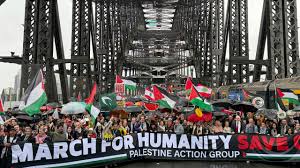
Introduction
Palestine Action, a group dedicated to protesting against the arms trade with Israel, has become increasingly relevant as geopolitical tensions in the Middle East heighten. Their mission to raise awareness about the impact of the arms industry on Palestinian lives is drawing significant attention. This article explores the recent activities of Palestine Action in 2023 and their implications for both the UK and global communities.
Recent Events
In recent months, Palestine Action has ramped up its campaign against Israeli arms manufacturers in the UK. Notably, their protests at factories like Elbit Systems, one of Israel’s largest defense contractors, have made headlines. In September, activists occupied Elbit’s site in Nottingham, asserting that the company plays a role in the oppression of Palestinian people. This action resulted in numerous arrests, bringing to light the controversial nature of arms exports to Israel.
The group has employed various forms of civil disobedience to amplify their message, including vandalism of military equipment and sit-ins, which align with their strategy of direct action. They argue that these measures are necessary to disrupt the operations that they claim contribute to human rights violations in Palestine. This has triggered a mixed response from the public, with some advocating for their cause while others criticise their methods.
Legislative Implications
The activities of Palestine Action have sparked discussions within the UK government regarding the regulation of arms sales to conflict zones. Following increased visibility, the UK Parliament is being urged to review its arms export licensing policies. Labour MP and human rights advocate, Bell Ribeiro-Addy, has voiced support for Palestine Action’s efforts, suggesting that the UK must take a clearer stance against complicity in what she calls war crimes.
Public Reaction
Public opinion remains divided. Many who support the movement emphasize the human rights perspective, arguing that ending the arms trade with Israel is a moral obligation. Conversely, critics assert that such protest tactics undermine serious dialogue on the Israel-Palestine conflict and could jeopardise the UK’s international relations.
Conclusion
Palestine Action’s activities highlight a growing urgency surrounding the discourse on arms sales and human rights. As tensions in the Middle East continue to fluctuate, the repercussions of their actions may extend beyond immediate protests, prompting legislative reviews and influencing public perceptions. Continued engagement and discussion about such matters will be crucial in guiding effective responses to the ethical dimensions of the arms trade. By keeping this dialogue alive, Palestine Action is not only influencing UK policies but also contributing to the broader narrative surrounding justice and accountability in global conflict.
You may also like

Marie Hobinger: A New Force in Environmental Activism

David Lammy: Championing Justice and Equality in Politics

All’s Fair: The Importance of Fairness in Society
SEARCH
LAST NEWS
- Remembering Wendy Richard: The Promise to Co-Star Natalie Cassidy
- How Did Anglian Water Achieve an ‘Essentials’ Rating for Mental Health Accessibility?
- Shai Hope Leads West Indies in T20 World Cup Clash Against South Africa
- What We Know About Weston McKennie: Future at Juventus and Past at Leeds
- What We Know About the Upcoming Live Nation Antitrust Trial